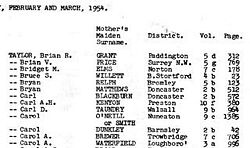Records Office Guide
Contents
A Guide To Information Available In Your Local Records Office
Index to Counties
The biggest headache in locating record offices is boundary changes. Records that relate to your area often end up archived in their original shire county despite the introduction of unitary authorities and metropolitan boroughs and counties.
To view the set up of Counties Prior to the changes implemented in 1974, click here
| Channel Islands and Crown Dependencies including the Isle of Man |
Births Marriages and Deaths
The system of civil registration of births, marriages and deaths in England and Wales was established on July 1st 1837. The country was divided into registration districts based on poor law unions. Today the system is based on the areas of local authorities. Each registration district is under the control of Superintendent Registrars and divided into sub-districts. Copies of registers are sent to the Registrar General and the indexes are compiled.
The indexes are divided into quarters for each year up to 1983. Remember the index relates to the time of registration NOT the time of the event. Since 1984 events have been arranged in alphabetical indexes covering a full year. Exact place of birth is not given, just name of the Registration District with a different reference numbering system.
The Office for National Statistics (ONS) Indexes and copies have been distributed nationwide. Some can be viewed in local libraries, County Records Offices or even Local Archive and History Study Centres. Now, these images are available online but the odd sheet is missing. You will not be charged for viewing these images.
Burial Records
- Text from the record-office-guide-revamp which has been tidied up/edited.
Parish Records
- Text from the record-office-guide-revamp which has been tidied up/edited.
Census Returns
What will I find?
On each census you should find recorded: Address, name, relationship to the head of the family, marital status, age at last birthday, gender, occupation, birthplace, disability.
Some censi only make reference to a household number rather than a formal numbered address.The 1841 Census did not declare relationship to head of household and was lacking in the detail of later censi - Ages of adults over the age of 15 were rounded up or down to the nearest 5 years -for example a man and wife aged 52
and 48 would both be recorded as aged 50.Ages of children below 15 were far more accurate.
You may find that with institutions, small villages and hamlets, residents or inmates are recorded using just intials, age and/or a birthplace (if known), or otherwise just initials.
Each entry on a census is given a four part reference :class (RG or HO) + piece + folio + page number, which is a unique reference given to a particular page.The example above is recorded as RG13/3194/50/2 Everyone recorded on one particular sheet will have this same code .The image below shows the class and piece reference found at the foot of the sheet.
Other Types of Records
- Archive Collections
- Architectural drawings and building plans
- Coroner’s Records
- Court Sessions and Victualler's Licences
- Directories: Trade, Street and City
- Electoral Registers and Poll Books
- Emigration and Immigration
- Hospital Records
- Manorial, Land and Estate Deeds
- Maps: Tithe and Ordnance Survey
- Military Records
- Newspapers and Journals
- Photographs
- Poor Law and Workhouse Records
- Records of Merchant Seamen
- School Records
- Taxation Records
- Wills and Probate



